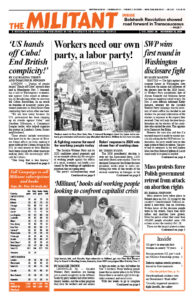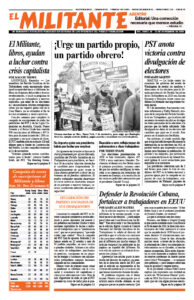November 27, 1995
The largest mobilizations against U.S. bases in decades have taken place in Japan recently. They were sparked by the rape of a 12-year-old Okinawan school girl. Three U.S. soldiers entered guilty pleas to conspiring to abduct and rape the girl. More and more Japanese working people are raising their voices against the U.S. military presence.
Between 60,000 and 85,000 people marched in Okinawa. Among the slogans the protesters shouted was “Yankee go home.” [U.S. Defense Secretary William] Perry said the Japanese have to accept some inconvenience in order to have the “credible security guarantee” provided by U.S. troops.
The protests have sent capitalist politicians scurrying to deliver some kind of change. The pressure was highlighted by [Prime Minister Tomiichi] Murayama’s statement that “the issue of Okinawa will be the issue that determines the fate of this cabinet.”
November 27, 1970
NEW YORK — The New York Women’s Strike Coalition, representing some 30 organizations, held a news conference Nov. 12 to announce a march of women and children Dec. 12. The women will demand that the city provide free, community-controlled public abortion clinics and 24-hour child-care centers.
The coalition hopes to expose and protest the fact that despite the liberalized abortion law in New York, abortions are still not available to women who need them. In addition to the restriction contained in the law that abortions must be performed by a doctor, further restrictions say that abortions must be done in hospitals or in clinics with hospital facilities and that hospitals are not required to take abortion cases.
Women’s liberation groups from eight colleges and universities in the city issued a statement endorsing the demonstration.
November 24, 1945
DETROIT — Despite the use of unlimited funds by Big Business in the most vicious anti-labor and anti-Negro campaign in the history of Detroit elections, labor’s mayoralty candidate Richard Frankensteen, vice-president of the CIO United Automobile Workers, received the total of 216,917 votes against 274,455 for incumbent Mayor Jeffries.
Frankensteen failed to inspire his followers to get out labor’s maximum vote. Had Frankensteen rallied the ranks of labor along class lines he would have stood an excellent chance of winning.
The SWP supported Frankensteen for election despite his bad union record and his lack of a sound political program. We gave him critical support because he was a labor candidate and it was necessary for all labor to unite.
This election has convinced labor that it no longer has to rely on the capitalist political “friends of labor.”

